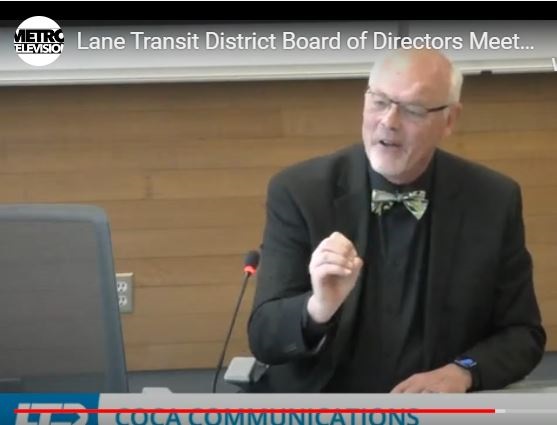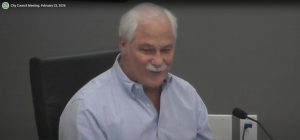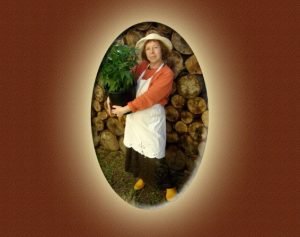Outgoing LTD planning director sees promise in new approach to community engagement
5 min read
LTD’s Mobility Planning and Policy Director attends his final board meeting before retiring from the agency. He quotes from Martin Luther King Jr. and the poet Amanda Gorman in passing the baton on the COCA—the Community Outreach and Communications Assessment. On April 24:
Tom Schwetz (LTD, Mobility Planning and Policy director): This started as we were talking about the notion of ‘reimagining the ride’ and doing things a little bit different, that one of the first things we needed to work on was developing that more consistent framework for communications. You might remember when we first started started talking about this, even the InfraStrategies folks said they’ve never done a project like this.
[00:00:40] As you know, we formed a Community Steering Council with the intent of bringing a broad range of individuals from around the community, community leaders, community people that have been involved in different things, different demographics to the table to talk about and help LTD develop a more sustainable and I think consistent way of communicating and then reaching out with the community.
[00:01:04] We had done a lot of work up front talking to community leaders to get a sense of where they thought we were at in terms of communications and how we might do better. After that, we met with additional community organizations just to get a really broad range of not just individuals, but ways in which they might be interacting with LTD or the community at large.
[00:01:27] Out of that came a draft community framework, communications framework, and we put that out for public review, as we do a lot of these things. Typically, we’d say, ‘Okay, thank you very much. You provided that output, we’ll make some changes as we see fit. And then we’ll take it to the board for adoption.’
[00:01:45] In the spirit of what it is we’re trying to do, we took a step back. And we said: ‘How should we use this framework to get concurrence with the board that this is the framework we want to use?’
[00:01:57] So we’re inviting the CSC (Community Steering Council) back to look at what the comments were, look at how we’re proposing to address those comments to create that final draft, get their input in that meeting, get that group conversation going around how we can make this the best that we can, moving forward. And then we’ll take what comes out of that, finalize with our consultants, InfraStrategies, a document that we’ll then take to SPC, and then, to the board for adoption.
[00:02:27] So that’s the process. But I wanted to just talk a little bit about what got us into this and how we’ve been thinking about this. This is coming up because I’m leaving. This is my last board meeting.
[00:02:40] But I’ll tell you, I’ve been doing this for a long time, done a lot of public outreach in a lot of different ways, good and bad. But this was the first opportunity I had to work on a process where we wanted to accomplish something different. We needed to change how we were engaging with the community. I can speak as being on the front lines of some of that, that, yeah, there’s better ways to engage with the community.
[00:03:05] I started out, most of my work has been in regional planning and developing new ideas and moving things forward, engaging communities and organizations. And when I came to LTD, I knew I was going to be doing a lot of that same work, but as long as I’d known LTD, I didn’t understand what they did and how they did it and why they did it.
[00:03:27] And that’s been the awesome transformation for me because the regional planning process for me is one where, to quote Amanda Gorman, remember her inauguration poem? I wrote it out just so I can get it right, but she said: ‘The new dawn blooms as we free it. For there is always light, if only we’re brave enough to see it, if only we’re brave enough to be it.’ That characterizes what I think we’ve been trying to do at a regional level in terms of engaging our partners.
[00:03:58] But here’s the thing, what our drivers are doing and what our operations folks and fleet folks are doing to make sure that we put that service out, I’m reminded of another quote, Martin Luther King, talked about ‘the fierce urgency of now.’ Now, he was talking about civil rights and the need to just be moving forward on that. But when you think about who uses our service and why they have that fierce urgency of now, they’re getting out. If they’re using our buses, they’re making sure that they’re there early so they don’t miss the bus, so they can get on the bus and get where they’re going.
[00:04:34] We facilitate that, that’s what we do, we get to do that. And it’s just, as I think about that, coming back to engaging with our community: Yeah, why aren’t we doing this better?
[00:04:46] And so I’m really happy with what we’re seeing. I’m hoping you find it useful as well in terms of how we want to create this framework, that’s going to be consistent, people can rely on it. And I hope that when I come back and look at it in 10 years, we’ve made some changes… Communities change. We’ve changed. It’s something that’s intended to be an ongoing kind of developing framework because we learn to engage more effectively with the community.
[00:05:14] So that’s it, in a nutshell. That’s what we’re bringing to you. I’m looking forward to watching this go through the process, but we’re doing it.
[00:05:25] John Q: Tom Schwetz in his farewell speech invokes the inauguration poem of Amanda Gorman and sees a new dawn bloom for LTD. The same collaborative engagement Tom used throughout his career in regional planning is now being extended to the whole community.




